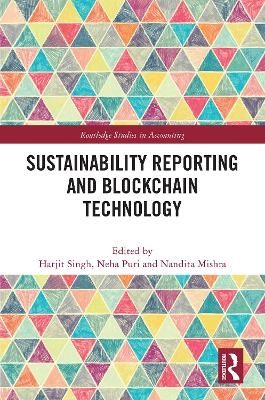
Sustainability Reporting and Blockchain Technology
Routledge (Verlag)
978-1-032-45710-9 (ISBN)
- Lieferbar (Termin unbekannt)
- Versandkostenfrei innerhalb Deutschlands
- Auch auf Rechnung
- Verfügbarkeit in der Filiale vor Ort prüfen
- Artikel merken
This book explores the much talked about but less understood issue of sustainability reporting, in a global context, linking it to the application of blockchain and other emerging technologies. It provides a transnational platform to examine the experiences of investors, researchers, academicians, and policymakers as they confront these concerns across a variety of industries and countries, thus offering best-practice guidance to assess the technological landscape and to model sustainable business initiatives. It offers relevant theoretical frameworks and the latest empirical research findings. Further, it argues that in order to reduce ‘carbon footprints’ globally, by reporting all their emissions through a single blockchain platform, companies can create a standardized space for data to be collected and tracked reliably, allowing for meaningful measurements.
The book benchmarks and analyses sustainability performance with respect to numerous laws, norms, codes, performance standards, and voluntary initiatives. It demonstrates how the organization influences and is influenced by expectations about sustainable development and emphasizes the link between financial and non-financial performance, enabling external stakeholders to understand the organization’s true value, along with tangible and intangible assets. It will enable readers to increase their understanding of the potential risks and opportunities and avoid environmental, social, and governance failures.
The book provides insight into existing research, practice, and outcomes that could clarify and promote the state of the art on themes such as the drivers for sustainability reporting, Environmental, Social, and Governance goals, the influence of blockchain on sustainability reporting as well as the issues and challenges. The book will be a useful guide for scholars, researchers, students, practitioners, regulators and policymakers alike.
Harjit Singh, Professor, Symbiosis Centre for Management Studies Noida, Symbiosis International University Pune, India Neha Puri, Associate Professor, Amity College of Commerce & Finance, Amity University Noida, India Nandita Mishra, Associate Professor, Department of Management and Engineering, Linköping University, Sweden
Part I: Blockchain and Sustainability Reporting Chapter 1: Blockchain and ESG: Unfolding Landscape of Sustainable Reporting Chapter 2: A bibliometric analysis of Blockchain in sustainability reporting Chapter 3: Role of Blockchain Technology in Sustainability Reporting Chapter 4: Blockchain Technology – A Robust Tool for CSR Communication Chapter 5: A Bibliometric Review on The Evolution of Technology in Sustainability Reporting: With Reference to Artificial Intelligence Chapter 6: Role of Blockchain in Enhancing the Quality of Sustainability Reporting Chapter 7: Sustainability Reporting Determinants: A comparative Analysis between Asia and Europe Chapter 8: Opportunities and Challenges for Better Sustainability Reporting Chapter 9: A Bibliometric and Visualisation Analysis of ESG Investment Research from 2011 to 2022 Part II: Applications of Blockchain and Sustainability Reporting Chapter 10: An Investigation of Blockchain Technology in Sustainable Energy Sector -Beyond Myth Chapter 11: The Unchained Sustainability: Exploring the Ripple Effect of Blockchain Technology on Hospitality’s Environmental Resilience Chapter 12: Search for Value Creation Through Blockchain Chapter 13: Blockchain Technology Applications in CSR Reporting Chapter 14: Blockchain Usage for CSR Reporting: Indian Perspectives and Corporate Practices Chapter 15: Role of Blockchain in Sustainability Reporting in the Banking Sector Chapter 16: Blockchain-Based Traceability Solutions for Environmental Sustainability Chapter 17: Blockchain Technology And Environment Sustainability Part III: Industrial Use Cases in ECG and CSR Chapter 18: Adoption of Blockchain in ESG (Environmental, Social, and Governance) Chapter 19: NextGen Strategies and Industry Use Cases in CSR and/or ESG Chapter 20: Blockchain technology enabler for CSR and ESG reporting Chapter 21: Emerging Perspective on Corporate Sustainability Reporting-Main Drivers Amongst COVID 19 Part IV: Future Outlook and NextGen Strategies Chapter 22: Cognitive Factors Motivating Blockchain Adoption Decisions in SCF for Indian MSMEs: Fuzzy-AHP-DEMETAL Approach Chapter 23: CEO attributes and CSR reporting in Jordan: new insight from the COVID-19 pandemic period Chapter 24: Country readiness in adopting a standardized global sustainability reporting system: A Porter’s diamond model perspective Chapter 25: Hydroponics and Sustainability: An Emerging Business Perspectives Chapter 26: Achieving Financial Inclusion Through Blockchain based Decentralized Finance and Fintech revolution
| Erscheinungsdatum | 04.12.2024 |
|---|---|
| Reihe/Serie | Routledge Studies in Accounting |
| Zusatzinfo | 30 Tables, black and white; 38 Line drawings, black and white; 38 Illustrations, black and white |
| Verlagsort | London |
| Sprache | englisch |
| Maße | 156 x 234 mm |
| Gewicht | 900 g |
| Themenwelt | Naturwissenschaften ► Biologie ► Ökologie / Naturschutz |
| Sozialwissenschaften ► Soziologie ► Spezielle Soziologien | |
| Wirtschaft ► Betriebswirtschaft / Management ► Marketing / Vertrieb | |
| Wirtschaft ► Betriebswirtschaft / Management ► Rechnungswesen / Bilanzen | |
| Wirtschaft ► Betriebswirtschaft / Management ► Unternehmensführung / Management | |
| Wirtschaft ► Volkswirtschaftslehre | |
| ISBN-10 | 1-032-45710-4 / 1032457104 |
| ISBN-13 | 978-1-032-45710-9 / 9781032457109 |
| Zustand | Neuware |
| Informationen gemäß Produktsicherheitsverordnung (GPSR) | |
| Haben Sie eine Frage zum Produkt? |
aus dem Bereich


